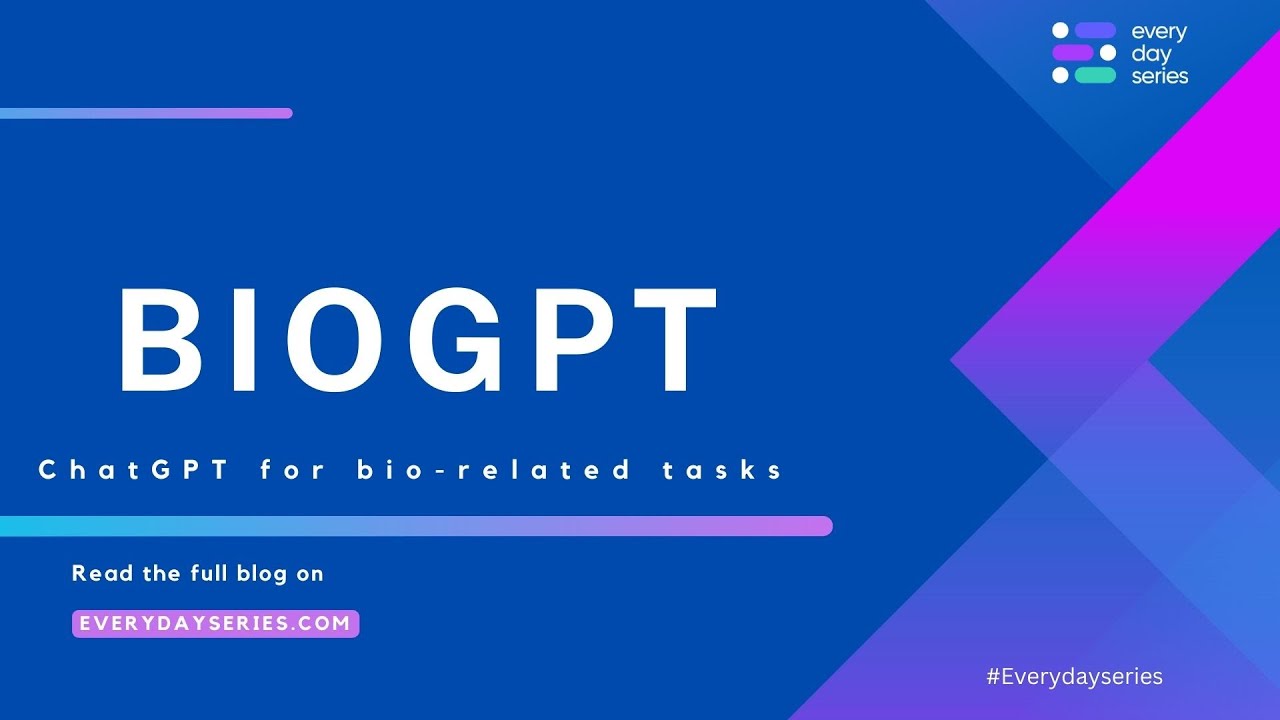BioGPT

In the realm of scientific discovery, the fusion of artificial intelligence (AI) and biology has led to groundbreaking innovations, propelling research into uncharted territories and revolutionizing our understanding of life sciences. Among the myriad applications of AI in biology, one remarkable advancement stands out: BioGPT. Combining the power of natural language processing with the intricacies of biological data, BioGPT emerges as a potent tool in the hands of researchers, promising to unlock new insights, accelerate drug discovery, and reshape the landscape of biomedical research.
Table of Contents
ToggleUnveiling BioGPT
At its core, BioGPT is an AI model built upon the foundations of the Generative Pre-trained Transformer (GPT) architecture, a state-of-the-art deep learning model developed by OpenAI. Trained on vast swathes of biomedical literature, molecular databases, and biological ontologies, BioGPT possesses an innate understanding of the language and concepts permeating the field of biology. This proficiency enables BioGPT to comprehend complex biological texts, generate coherent scientific hypotheses, and facilitate data-driven decision-making in research endeavors.
Leveraging Natural Language Understanding
One of the distinguishing features of BioGPT is its proficiency in natural language understanding. By ingesting and processing large volumes of biomedical literature, BioGPT develops a nuanced comprehension of scientific texts, encompassing molecular interactions, cellular processes, and disease mechanisms. This adeptness empowers researchers to pose intricate queries, sift through vast repositories of data, and extract pertinent information with unprecedented efficiency.
Moreover, BioGPT excels in contextual understanding, discerning the subtle nuances and implications embedded within scientific discourse. Whether unraveling the intricacies of protein-protein interactions or elucidating the molecular underpinnings of complex diseases, BioGPT’s natural language processing capabilities streamline the exploration of biological phenomena, fostering a deeper understanding of the underlying mechanisms governing life processes.
Accelerating Drug Discovery
The quest for novel therapeutics represents a formidable challenge in biomedical research, necessitating the exploration of vast chemical space and the identification of promising drug candidates. Herein lies the transformative potential of BioGPT, as it augments the drug discovery process with its data-driven insights and predictive capabilities.
BioGPT facilitates the elucidation of drug-target interactions, predicting potential binding affinities between small molecules and biological targets with remarkable accuracy. By analyzing molecular structures, pharmacological profiles, and biochemical pathways, BioGPT assists researchers in identifying lead compounds, optimizing drug design, and expediting the development of targeted therapies for a myriad of ailments.
Furthermore, BioGPT contributes to the repurposing of existing drugs, leveraging its knowledge base to uncover novel indications and therapeutic avenues for approved pharmaceutical agents. This approach not only accelerates the pace of drug discovery but also mitigates the risks associated with traditional drug development, offering a cost-effective strategy for addressing unmet medical needs.
Empowering Biomedical Research
Beyond its applications in drug discovery, BioGPT serves as a versatile tool for empowering various facets of biomedical research. From hypothesis generation to experimental design, BioGPT aids researchers in navigating the complexities of biological systems, guiding scientific inquiry towards fruitful avenues of exploration.
In the realm of genomics, BioGPT facilitates the interpretation of genomic data, deciphering the functional significance of genetic variations and uncovering novel gene-disease associations. By integrating genomic information with clinical data, BioGPT facilitates personalized medicine initiatives, enabling tailored interventions based on individual genetic profiles.
Moreover, BioGPT enhances the accessibility of biomedical knowledge, democratizing scientific inquiry and fostering collaboration within the research community. Through its ability to distill complex concepts into digestible insights, BioGPT empowers researchers across disciplines to harness the power of AI in advancing our understanding of biology and addressing pressing healthcare challenges.
Ethical Considerations and Future Directions
While the advent of BioGPT heralds a new era of innovation in biomedical research, it also raises important ethical considerations regarding data privacy, bias mitigation, and responsible AI deployment. As researchers continue to harness the capabilities of AI in biological applications, it is imperative to uphold ethical standards, ensure transparency in decision-making, and prioritize the well-being of individuals and communities affected by AI-driven interventions.
Looking ahead, the future holds immense promise for BioGPT and its ilk, as advancements in AI technology continue to push the boundaries of what is possible in biomedical research. From unraveling the complexities of the human proteome to accelerating the discovery of precision therapies, BioGPT stands poised to catalyze transformative changes in the life sciences, propelling us towards a future where AI and biology converge to unlock the secrets of life itself.
Conclusion
BioGPT represents a paradigm shift in biomedical research, harnessing the power of AI to illuminate the intricacies of living systems and accelerate the pace of scientific discovery. As researchers harness the capabilities of BioGPT to unravel the mysteries of biology and develop innovative solutions to pressing healthcare challenges, the synergistic interplay between AI and biology promises to reshape the landscape of medicine, ushering in a new era of precision healthcare and personalized interventions tailored to the needs of individuals and populations alike.





